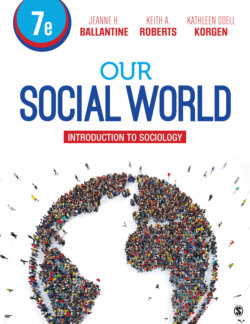Читать книгу Our Social World - Kathleen Odell Korgen - Страница 68
На сайте Литреса книга снята с продажи.
What Will You Learn in This Chapter?
ОглавлениеThis chapter will help you to do the following:
2.1 Outline the development of sociology
2.2 Describe key theoretical perspectives
2.3 Explain the scientific approach
2.4 Outline the basic steps of the scientific research process
Let us travel to the Southern Hemisphere to meet a teenage boy, Hector. He is a 16-year-old, living in a favela (slum) on the outskirts of São Paulo, Brazil. He is a polite, bright boy, but his chances of getting an education and a steady job in his world are limited. Like millions of other children around the world, he comes from a poor rural family that migrated to an urban area in search of a better life. However, his family ended up in a crowded slum with only a shared spigot for water and one string of electric lights along the dirt road going up the hill on which they live. The sanitary conditions in his community are appalling—open sewers and no garbage collection—and make the people susceptible to various diseases. His family is relatively fortunate, for they have cement walls and wood flooring but no bathroom, running water, or electricity. Many adjacent dwellings are little more than cardboard walls with corrugated metal roofs and dirt floors.
Hector wanted to stay in school but was forced to drop out to help support his family. Since leaving school, he has picked up odd jobs—deliveries, trash pickup, janitorial work, and gardening—to help pay for the family’s dwelling and to buy food to support his parents and six siblings. Even when he was in school, Hector’s experience was discouraging. He was not a bad student, and some teachers encouraged him to continue, but other students from the city teased the favela kids and made them feel unwelcome. Most of his friends dropped out before he did. Hector often missed school because of other obligations: looking for part-time work, helping a sick relative, or taking care of a younger sibling. The immediate need to put food on the table outweighed the long-term value of staying in school. What is the bottom line for Hector and millions like him? Because of his limited education and work skills, obligations to his family, and limited opportunities, he most likely will continue to live in poverty along with millions of others in this situation.
▲ Slum dwellers of São Paulo, Brazil. Hector lives in a neighborhood with shelters made of available materials such as boxes, with no electricity or running water and poor sanitation.
© Getty/Christopher Pillitz/Contributor
Sociologists are interested in factors that influence the social world of children like Hector: family, friends, school, community, and the place of one’s nation in the global political and economic structural systems. Sociologists use social theories and scientific methods to examine and understand poverty and many other social issues. In this chapter, you will learn about some of the different data collection methods sociologists use to collect information and the theories they use to make sense of their data.
Sociological research helps us to understand how and why society operates and how we might change it. It can also help you make sense of why people in your family, neighborhood, college campus, and workplace act the way they do. You will, no doubt, find yourself in a situation where conducting a research study will help your organization or community.
This chapter introduces you to the basic tools used to plan studies and gather dependable information on topics of interest. It will also help you understand how sociology approaches research questions. To this end, we begin this chapter by discussing the development of sociology as a discipline and the core principles of sociology’s major theoretical perspectives. We then explore sociology as a science—core ideas that underlie any science: how to collect data, ethical issues involving research, and practical applications and uses of sociological knowledge. We start with the beginnings and emergence of sociology as a field of study.
